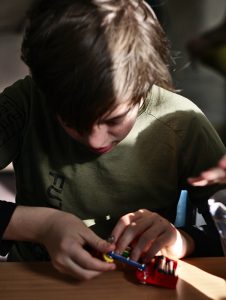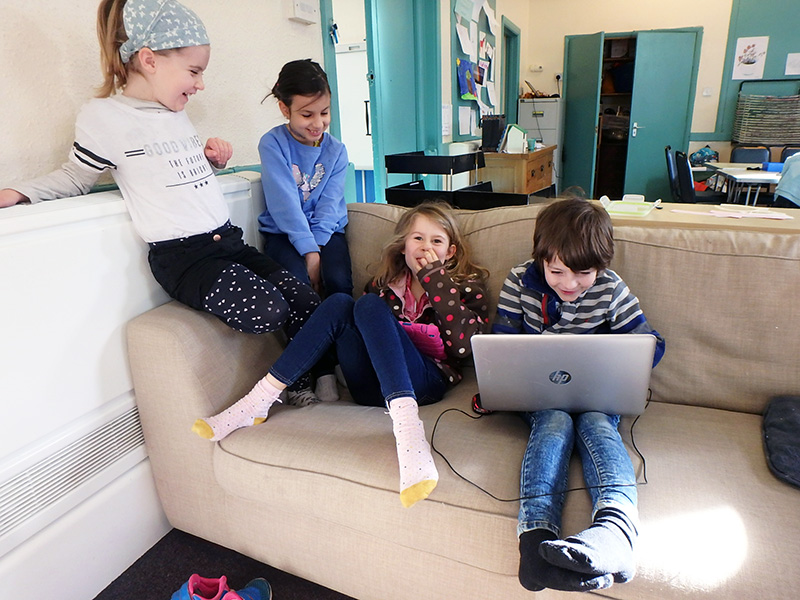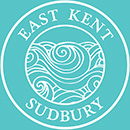At East Kent Sudbury we believe that learning is most authentic, effective and long lasting when it is freely chosen by the learner. We also believe that the right to self-determination, which we enjoy as adults also belongs to children. It is for these reasons that we fiercely defend our students’ right to choose freely how they spend their time at EKS. But what do we mean by making a free choice? How do they know what’s out there to choose from? Should the adults in the community carefully curate a selection of choices for them to choose from or should we trust in the child’s ability to navigate the world freely discovering things along the way?

If we decide to go down the first path who decides which choices to present? How would you choose from the whole world of possible interests which ones are of enough value to include and which ones to leave out? Afterall the National Curriculum is just that – a selection of things that a small panel of people thought all children in the UK should learn and at what age, but why that selection? Why World War I and not the fall of the Berlin Wall? Why French and not Japanese? Why learn to write in cursive instead of touch typing? Given that the workplace is changing more rapidly than ever before it is becoming harder and harder to know what jobs will be available when today’s children write their first CV. How can anyone predict what any one child should learn in order to be successful later in life, let alone all children?
When we trust students to find their own interests, it is easy to worry about them growing up with gaps in their knowledge or missing out on discovering a passion simply through a lack of exposure to it. So how do children discover new things if we don’t intentionally introduce them?
Let’s just turn the question around for a second and forget we’re talking about children. How do you discover new things? The internet, TV, magazines, books, a friend, a poster. Sometimes we can’t even trace where we first heard about something. In such an information rich world can you really imagine not knowing about the various forms of art, music, food, language, sport and millions of other things that are of interest in the world?
Our students are just like you only they’ve been born into this information-rich age. They are digital-natives, finding things out is what they do best. Add to that a rich environment packed with books and resources, an empowering democratic system that gives them the agency to make things happen and top it off with a busy social life mixing with others of all ages, backgrounds and diverse interests – and now ask yourself how they will discover wet felting, Spanish or free jazz. Our students don’t need us to put these things before them. They are more than capable of discovering them for themselves.

New knowledge and interests can also come from the unlikeliest of sources. Some of the richest, broadest conversations I’ve had with my daughter started with an advert. A recent example was when we saw this slogan “You want the remote, You can’t handle the remote” on the side of a van driving home. After her initial questions, why does it say that? What’s it advertising? I explained about the famous line from A Few Good Men and how it was a play on the quote. From there we talked about other famous movie lines and found that Jack Nicolson comes up quite a bit. She wanted to know how so many people knew this line? When can she watch the movie? What was it about? What was the truth? Why did they make a pun on the quote? What other word plays do I know and on it went. Each piece of new information being added to the giant jigsaw that makes up her model of the world as she understands it right now, each creating new avenues to explore at a later date. As parents and educators, we often want to steer children towards the information that we value most highly but given examples like this we can see how the simplest of things that we stumble across in the course of an ordinary day can lead to unexpected places. Time tabling children’s time or even prioritising content sources, for example with screen time restrictions, can be just as limiting as they are meant to be expanding.
In a recent article in which Dr Kevin Currie-Knight interviews grown Unschoolers, he addresses the concern about gaps in knowledge. The Unschoolers explained that when they are faced with something they would like to know about but don’t they simply set about learning about it – a gap is not a loss or dead end, but rather an opportunity. Sudbury Valley School graduates report a similar attitude to learning new things in studies such as Legacy of Trust and The Pursuit of Happiness. We all have gaps regardless of our educational background but what self-directed learners are particularly good at is recognising a gap and relishing it as a challenge and chance to discover something new.
It is at this point in a conversation with someone just discovering our model that they ask but what if we just put things out, made them available, so its that bit easier to discover. The adults in our community are equal to everyone else and just like the students we come in with our own histories and interests, of course we share these with those around us just as they share their interests with us. But to strategically place craft materials or books where students may find them would be inauthentic and the message that would be relayed is not about the thing itself but about trust. Instead of being grateful for the new resource students feel that they are not trusted to discover interests of value by themselves, or worse that we don’t approve of their current interests and so want to guide them in a more productive direction. This sense of mistrust and judgment are in direct contrast to our fundamental principle: children are people, whole people, people with rights including the right to chart the course of their own lives. And if our children are going to make these choices for themselves, they must be free choices. Choices made without unwanted guidance or fear of judgment.
“Every time we teach a child something, we keep him from inventing it himself. On the other hand, that which we allow him to discover for himself will remain with him visible for the rest of his life. ” ~ Jean Piaget


Hi kesia I work at teepee Woods self-directed Learning Community in Essex. this is my first time using a speaker too tight for me so excuse how it’s coming out…. laughter. I am still learning an awful lot about self-directed learning this is a wonderful article. increasingly I am realising that although I went to the conventional School since leaving at 15 I have very much been a self-directed learner throughout my whole life. I work as a facilitator at teepee Woods. I find everyday is a learning day that’s why it is so much fun . At least most of the time. …. Lol
I think it is so easy to fall into the trap as a parent or educator to panic and feel like we aren’t doing enough to ‘educate’ our children – as though the only way it will happen is if we make it happen. Unfortunately as adults letting go of our ego can be extremely difficult at times. Most of us never worry about when they will walk or talk, nor do we give them demonstrations of how to do either. We simply trust that it will happen. This is a great post and came at the perfect time for me, as I have been questioning how much I do as a parent and feeling like I need to become more of a ‘Pinterest Mum’ (putting out lots of activities for the kids etc) but actually when I watch all three of my children I realise how comfortable they all are in their unique indivduality. They feel safe in making choices that maybe aren’t what I would personally choose and feel free to express themselves and that’s amazing.
Thank you Laura. I agree it is so hard as a parent (and staff member) to let go of our egos. The students have taught me a lesson on this in the last few weeks too.